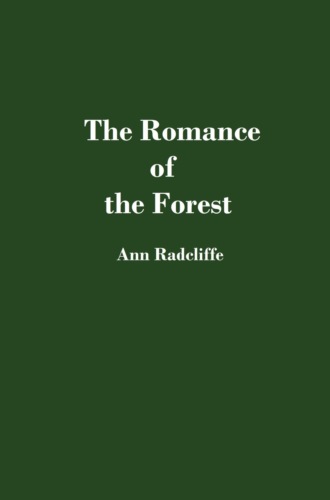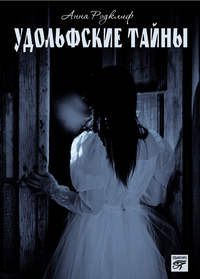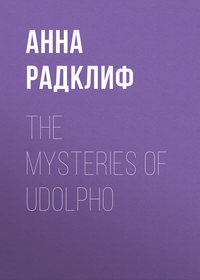
Полная версия
The Romance of the Forest
I am the only child, said Adeline, Of Louis de St. Pierre, a chevalier of reputable family, but of small fortune, who for many years resided at Paris. Of my mother I have a faint remembrance: I lost her when I was only seven years old, and this was my first misfortune. At her death, my father gave up housekeeping, boarded me in a convent, and quitted Paris. Thus was I, at this early period of my life, abandoned to strangers. My father came sometimes to Paris; he then visited me, and I well remember the grief I used to feel when he bade me farewell. On these occasions, which wrung my heart with grief, he appeared unmoved; so that I often thought he had little tenderness for me. But he was my father, and the only person to whom I could look up for protection and love.
In this convent I continued till I was twelve years old. A thousand times I had entreated my father to take me home; but at first, motives of prudence, and afterwards of avarice, prevented him. I was now removed from this convent, and placed in another, where I learned my father intended I should take the veil. I will not attempt to express my surprise and grief on this occasion. Too long I had been immured in the walls of a cloister, and too much had I seen of the sullen misery of its votaries, not to feel horror and disgust at the prospect of being added to their number.
The Lady Abbess was a woman of rigid decorum and severe devotion: exact in the observance of every detail of form, and never forgave an offence against ceremony. It was her method, when she wanted to make converts to her order, to denounce and terrify, rather than to persuade and allure. Hers were the arts of cunning practised upon fear, not those of sophistication upon reason. She employed numberless stratagems to gain me to her purpose, and they all wore the complexion of her character. But in the life to which she would have devoted me, I saw too many forms of real terror, to be overcome by the influence of her ideal host, and was resolute in rejecting the veil. Here I passed several years of miserable resistance against cruelty and superstition. My father I seldom saw; when I did, I entreated him to alter my destination; but he objected that his fortune was insufficient to support me in the world, and at length denounced vengeance on my head if I persisted in disobedience.
You, my dear Madam, can form little idea of the wretchedness of my situation, condemned to perpetual imprisonment, and imprisonment of the most dreadful kind, or to the vengeance of a father, from whom I had no appeal. My resolution relaxed – for some time I paused upon the choice of evils – but at length the horrors of the monastic life rose so fully to my view, that fortitude gave way before them. Excluded from the cheerful intercourse of society – from the pleasant view of nature – almost from the light of day – condemned to silence – rigid formality – abstinence and penance – condemned to forgo the delights of a world which imagination painted in the gayest and most alluring colours, and whose hues were, perhaps, not the less captivating because they were only ideal – such was the sate to which I was destined. Again my resolution was invigorated: my father's cruelty subdued tenderness, and roused indignation. Since he can forget, said I, the affection of a parent, and condemn his child without remorse to wretchedness and despair – the bond of filial and parental duty no longer subsists between us – he has himself dissolved it, and I will yet struggle for liberty and life.
Finding me unmoved by menace, the Lady Abbess had now recourse to more subtle measures: she condescended to smile, and even to flatter; but hers was the distorted smile of cunning, not the gracious emblem of kindness; it provoked disgust, instead of inspiring affection. She painted the character of a vestal in the most beautiful tints of art – its holy innocence – its mild dignity – its sublime devotion. I sighed as she spoke. This she regarded as a favourable symptom, and proceeded on her picture with more animation. She described the serenity of a monastic life – its security from the seductive charms, restless passions, and sorrowful vicissitudes of the world – the rapturous delights of religion, and the sweet reciprocal affection of the sisterhood.
So highly she finished the piece, that the lurking lines of cunning would, to an inexperienced eye, have escaped detection. Mine was too sorrowfully informed. Too often had I witnessed the secret tear and bursting sigh of vain regret, the sullen pinings of discontent, and the mute anguish of despair. My silence and my manner assured her of my incredulity, and it was with difficulty that she preserved a decent composure.
My father, as may be imagined, was highly incensed at my perseverance, which he called obstinacy; but, what will not be so easily believed, he soon after relented, and appointed a day to take me from the convent. O! judge of my feelings when I received this intelligence. The joy it occasioned awakened all my gratitude; I forgot the former cruelty of my father, and that the present indulgence was less the effect of his kindness than of my resolution. I wept that I could not indulge his every wish.
What days of blissful expectation were those that preceded my departure! The world, from which I had been hitherto secluded – the world, in which my fancy had been so often delighted to roam – whose paths were strewn with fadeless roses – whose every scene smiled in beauty and invited to delight – where all the people were good, and all the good happy – Ah! then that world was bursting upon my view. Let me catch the rapturous remembrance before it vanish! It is like the passing lights of autumn, that gleam for a moment on a hill, and then leave it to darkness. I counted the days and hours that withheld me from this fairy land. It was in the convent only that people were deceitful and cruel; it was there only that misery dwelt. I was quitting it all! How I pitied the poor nuns that were to be left behind! I would have given half that world I prized so much, had it been mine, to have taken them out with me.
The long wished for day at last arrived. My father came, and for a moment my joy was lost in the sorrow of bidding farewell to my poor companions, for whom I had never felt such warmth of kindness as at this instant. I was soon beyond the gates of the convent. I looked around me, and viewed the vast vault of heaven no longer bounded by monastic walls, and the green earth extended in hill and dale to the round verge of the horizon! My heart danced with delight, tears swelled in my eyes, and for some moments I was unable to speak. My thoughts rose to heaven in sentiments of gratitude to the Giver of all good!
At length I returned to my father: Dear Sir, said I, how I thank you for my deliverance, and how I wish I could do every thing to oblige you!
Return, then, to your convent, said he in a harsh accent. I shuddered: his look and manner jarred the tone of my feelings; they struck discord upon my heart! which had before responded only to harmony. The ardour of joy was in a moment repressed, and every object around me was saddened with the gloom of disappointment. It was not that I suspected my father would take me back to the convent; but that his feelings seemed so very dissonant to the joy and gratitude which I had but a moment before felt and expressed to him. – Pardon, Madam, a relation of these trivial circumstances; the strong vicissitudes of feeling which they impressed upon my heart, make me think them important, when they are, perhaps, only disgusting.
No, my dear, said Madame La Motte, they are interesting to me; they illustrate little traits of character, which I love to observe. You are worthy of all my regards, and from this moment I give my tenderest pity to your misfortunes, and my affection to your goodness.
These words melted the heart of Adeline; she kissed the hand which Madame held out, and remained a few minutes silent. At length she said, May I deserve this goodness! and may I ever be thankful to God, who, in giving me such a friend, has raised me to comfort and hope!
My father's house was situated a few leagues on the other side of Paris, and in our way to it we passed through that city. What a novel scene! Where were now the solemn faces, the demure manners I had been accustomed to see in the convent? Every countenance was here animated, either by business or pleasure; every step was airy, and every smile was gay. All the people appeared like friends; they looked and smiled at me; I smiled again, and wished to have told them how pleased I was. How delightful, said I, to live surrounded by friends!
What crowded streets! what magnificent hotels! what splendid equipages! I scarcely observed that the streets were narrow, or the way dangerous. What bustle, what tumult, what delight! I could never be sufficiently thankful that I was removed from the convent. Again I was going to express my gratitude to my father, but his looks forbad me, and I was silent. I am too diffuse; even the faint forms which memory reflects of passed delight are grateful to the heart. The shadow of pleasure is still gazed upon with a melancholy enjoyment, though the substance is fled beyond our reach.
Having quitted Paris, which I left with many sighs, and gazed upon till the towers of every church dissolved in distance from my view, we entered upon a gloomy and unfrequented road. It was evening when we reached a wild heath; I looked round in search of a human dwelling, but could find none; and not a human being was to be seen. I experienced something of what I used to feel in the convent; my heart had not been so sad since I left it. Of my father, who still sat in silence, I inquired if we were near home; he answered in the affirmative. Night came on, however, before we reached the place of our destination; it was a lone house on the waste; but I need not describe it to you, Madam. When the carriage stopped, two men appeared at the door, and assisted us to alight: so gloomy were their countenances, and so few their words, I almost fancied myself again in the convent; certain it is, I had not seen such melancholy faces since I quitted it. Is this a part of the world I have so fondly contemplated? said I.
The interior appearance of the house was desolate and mean; I was surprised that my father had chosen such a place for his habitation, and also that no woman was to be seen; but I knew that inquiry would only produce a reproof, and was therefore silent. At supper, the two men I had before seen sat down with us; they said little, but seemed to observe me much. I was confused and displeased; which my father noticing, frowned at them with a look which convinced me he meant more than I comprehended. When the cloth was drawn, my father took my hand and conducted me to the door of my chamber; having set down the candle, and wished me good night, he left me to my own solitary thoughts.
How different were they from those I had indulged a few hours before! then expectation, hope, delight, danced before me; now melancholy and disappointment chilled the ardour of my mind, and discoloured my future prospect. The appearance of every thing around conduced to depress me. On the floor lay a small bed without curtains or hangings; two old chairs and a table were all the remaining furniture in the room. I went to the window, with an intention of looking out upon the surrounding scene, and found it was grated. I was shocked at this circumstance, and comparing it with the lonely situation and the strange appearance of the house, together with the countenances and behaviour of the men who had supped with us, I was lost in a labyrinth of conjecture.
At length I lay down to sleep; but the anxiety of my mind prevented repose; gloomy unpleasing images flitted before my fancy, and I fell into a sort of waking dream: I thought that I was in a lonely forest with my father; his looks were severe, and his gestures menacing: he upbraided me for leaving the convent, and while he spoke, drew from his pocket a mirror, which he held before my face; I looked in it and saw, (my blood now thrills as I repeat it) I saw myself wounded, and bleeding profusely. Then I thought myself in the house again; and suddenly heard these words, in accents so distinct, that for some time after I awoke I could scarcely believe them ideal, Depart this house, destruction hovers here.
I was awakened by a footstep on the stairs; it was my father retiring to his chamber; the lateness of the hour surprised me, for it was past midnight.
On the following morning, the party of the preceding evening assembled at breakfast, and were as gloomy and silent as before. The table was spread by a boy of my father's; but the cook and the housemaid, whatever they might be, were invisible.
The next morning I was surprised, on attempting to leave my chamber, to find the door locked; I waited a considerable time before I ventured to call; when I did, no answer was returned; I then went to the window, and called more loudly, but my own voice was still the only sound I heard. Near an hour I passed in a state of surprise and terror not to be described: at length I heard a person coming up stairs, and I renewed the call; I was answered, that my father had that morning set off for Paris, whence he would return in a few days; in the meanwhile he had ordered me to be confined in my chamber. On my expressing surprise and apprehension at this circumstance, I was assured I had nothing to fear, and that I should live as well as if I was at liberty.
The latter part of this speech seemed to contain an odd kind of comfort; I made little reply, but submitted to necessity. Once more I was abandoned to sorrowful reflection: what a day was the one I now passed! alone, and agitated with grief and apprehension. I endeavoured to conjecture the cause of this harsh treatment; and at length concluded it was designed by my father, as a punishment for my former disobedience. But why abandon me to the power of strangers, to men, whose countenances bore the stamp of villainy so strongly as to impress even my inexperienced mind with terror! Surmise involved me only deeper in perplexity, yet I found it impossible to forbear pursuing the subject; and the day was divided between lamentation and conjecture. Night at length came, and such a night! Darkness brought new terrors: I looked round the chamber for some means of fastening my door on the inside, but could perceive none; at last I contrived to place the back of a chair in an oblique direction, so as to render it secure.
I had scarcely done this, and lain down upon my bed in my clothes, not to sleep, but to watch, when I heard a rap at the door of the house, which was opened and shut so quickly, that the person who had knocked, seemed only to deliver a letter or message. Soon after, I heard voices at intervals in a room below stairs, sometimes speaking very low, and sometimes rising all together, as if in dispute. Something more excusable than curiosity made me endeavour to distinguish what was said, but in vain; now and then a word or two reached me, and once I heard my name repeated, but no more.
Thus passed the hours till midnight, when all became still. I had lain for some time in a state between fear and hope, when I heard the lock of my door gently moved backward and forward; I started up and listened; for a moment it was still, then the noise returned, and I heard a whispering without; my spirits died away, but I was yet sensible. Presently an effort was made at the door, as if to force it; I shrieked aloud, and immediately heard the voices of the men I had seen at my father's table: they called loudly for the door to be opened, and on my returning no answer, uttered dreadful execrations. I had just strength sufficient to move to the window, in the desperate hope of escaping thence; but my feeble efforts could not even shake the bars. O! how can I recollect these moments of horror, and be sufficiently thankful that I am now in safety and comfort!
They remained some time at the door, then they quitted it, and went down stairs. How my heart revived at every step of their departure! I fell upon my knees, thanked God that he had preserved me this time, and implored his further protection. I was rising from this short prayer, when suddenly I heard a noise in a different part of the room, and on looking round, I perceived the door of a small closet open, and two men enter the chamber.
They seized me, and I sunk senseless in their arms; how long I remained in this condition I know not; but on reviving, I perceived myself again alone, and heard several voices from below stairs. I had presence of mind to run to the door of the closet, my only chance of escape; but it was locked! I then recollected it was possible that the ruffians might have forgot to turn the key of the chamber door, which was held by the chair; but here, also, I was disappointed. I clasped my hands in an agony of despair, and stood for some time immoveable.
A violent noise from below roused me, and soon after I heard people ascending the stairs: I now gave myself up for lost. The steps approached, the door of the closet was again unlocked. I stood calmly, and again saw the men enter the chamber; I neither spoke, nor resisted: the faculties of my soul were wrought up beyond the power of feeling; as a violent blow on the body stuns for awhile the sense of pain. They led me down stairs; the door of a room below was thrown open, and I beheld a stranger; it was then that my senses returned; I shrieked and resisted, but was forced along. It is unnecessary to say that this stranger was Monsieur La Motte, or to add, that I shall for ever bless him as my deliverer.
Adeline ceased to speak; Madame La Motte remained silent. There were some circumstances in Adeline's narrative, which raised all her curiosity. She asked if Adeline believed her father to be a party in this mysterious affair. Adeline, though it was impossible to doubt that he had been principally and materially concerned in some part of it, thought, or said she thought, he was innocent of any intention against her life. Yet, what motive, said Madame La Motte, could there be for a degree of cruelty so apparently unprofitable? – Here the inquiry ended; and Adeline confessed she had pursued it till her mind shrunk from all further research.
The sympathy which such uncommon misfortune excited, Madame La Motte now expressed without reserve, and this expression of it strengthened the tie of mutual friendship. Adeline felt her spirits relieved by the disclosure she had made to Madame La Motte; and the latter acknowledged the value of the confidence, by an increase of affectionate attentions.
Chapter IV
…My May of lifeIs fall'n into the sear, the yellow leaf.MACBETH.Full oft, unknowing and unknown,He wore his endless noons alone,Amid th' autumnal wood:Oft was he wont in hasty fit,Abrupt the social board to quit.WHARTON.La Motte had now passed above a month in this seclusion; and his wife had the pleasure to see him recover tranquillity and even cheerfulness. In this pleasure Adeline warmly participated; and she might justly have congratulated herself as one cause of his restoration; her cheerfulness and delicate attention had effected what Madame La Motte's greater anxiety had failed to accomplish. La Motte did not seem regardless of her amiable disposition, and sometimes thanked her in a manner more earnest than was usual with him. She, in her turn, considered him as her only protector and now felt towards him the affection of a daughter.
The time she had spent in this peaceful retirement had softened the remembrance of past events, and restored her mind to its natural tone: and when memory brought back to her view the former short and romantic expectations of happiness, though she gave a sigh to the rapturous illusion, she less lamented the disappointment, than rejoiced in her present security and comfort.
But the satisfaction which La Motte's cheerfulness diffused around him was of short continuance; he became suddenly gloomy and reserved; the society of his family was no longer grateful to him; and he would spend whole hours in the most secluded parts of the forest, devoted to melancholy and secret grief. He did not, as formerly, indulge the humour of his sadness, without restraint, in the presence of others; he now evidently endeavoured to conceal it, and affected a cheerfulness that was too artificial to escape detection.
His servant Peter, either impelled by curiosity or kindness, sometimes followed him unseen, into the forest. He observed him frequently retire to one particular spot, in a remote part, which having gained, he always disappeared, before Peter, who was obliged to follow at a distance, could exactly notice where. All his endeavours, now prompted by wonder and invigorated by disappointment, were unsuccessful, and he was at length compelled to endure the tortures of unsatisfied curiosity.
This change in the manners and habits of her husband was too conspicuous to pass unobserved by Madame La Motte, who endeavoured, by all the stratagems which affection could suggest, or female invention supply, to win him to her confidence. He seemed insensible to the influence of the first, and withstood the wiles of the latter. Finding all her efforts insufficient to dissipate the glooms which overhung his mind, or to penetrate their secret cause, she desisted from further attempt, and endeavoured to submit to this mysterious distress.
Week after week elapsed, and the same unknown cause sealed the lips and corroded the heart of La Motte. The place of his visitation in the forest had not been traced. Peter had frequently examined round the spot where his master disappeared, but had never discovered any recess which could be supposed to conceal him. The astonishment of the servant was at length raised to an insupportable degree, and he communicated to his mistress the subject of it.
The emotion which this information excited, she disguised from Peter, and reproved him for the means he had taken to gratify his curiosity. But she revolved this circumstance in her thoughts, and comparing it with the late alteration in his temper, her uneasiness was renewed, and her perplexity considerably increased. After much consideration, being unable to assign any other motive for his conduct, she began to attribute it to the influence of illicit passion; and her heart, which now out-ran her judgment, confirmed the supposition, and roused all the torturing pangs of jealousy.
Comparatively speaking, she had never known affliction till now: she had abandoned her dearest friends and connexions – had relinquished the gaieties, the luxuries, and almost the necessaries of life; – fled with her family into exile, an exile the most dreary and comfortless; experiencing the evils of reality, and those of apprehension, united: all these she had patiently endured, supported by the affection of him for whose sake she suffered. Though that affection, indeed, had for some time appeared to be abated, she had borne its decrease with fortitude; but the last stroke of calamity, hitherto withheld, now came with irresistible force – the love, of which she lamented the loss, she now believed was transferred to another.
The operation of strong passion confuses the powers of reason, and warps them to its own particular direction. Her usual degree of judgment, unopposed by the influence of her heart, would probably have pointed out to Madame La Motte some circumstances upon the subject of her distress, equivocal, if not contradictory to her suspicions. No such circumstances appeared to her, and she did not long hesitate to decide, that Adeline was the object of her husband's attachment. Her beauty out of the question, who else, indeed, could it be in a spot thus secluded from the world?
The same cause destroyed, almost at the same moment, her only remaining comfort; and when she wept that she could no longer look for happiness in the affection of La Motte, she wept also, that she could no longer seek solace in the friendship of Adeline. She had too great an esteem for her, to doubt, at first, the integrity of her conduct; but, in spite of reason, her heart no longer expanded to her with its usual warmth of kindness. She shrunk from her confidence; and as the secret broodings of jealousy cherished her suspicions, she became less kind to her, even in manner.
Adeline, observing the change, at first attributed it to accident, and afterwards to a temporary displeasure arising from some little inadvertency in her conduct. She, therefore, increased her assiduities; but perceiving, contrary to all expectation, that her efforts to please failed of their usual consequence, and that the reserve of Madame's manner rather increased than abated, she became seriously uneasy, and resolved to seek an explanation. This Madame La Motte as sedulously avoided, and was for some time able to prevent. Adeline, however, too much interested in the event to yield to delicate scruples, pressed the subject so closely, that Madame, at first agitated and confused, at length invented some idle excuse, and laughed off the affair.











